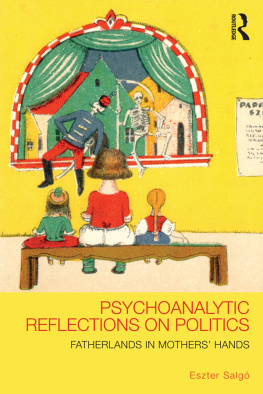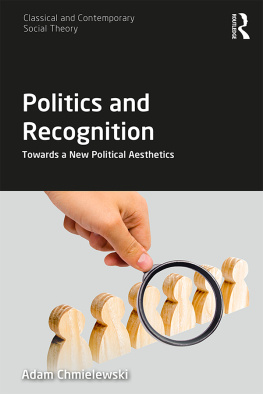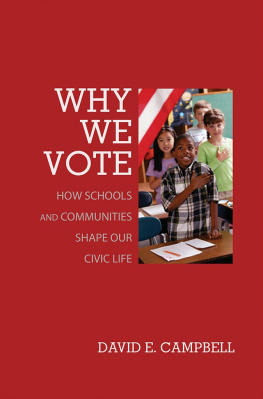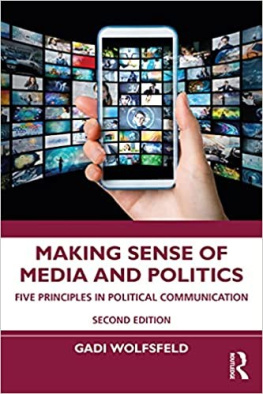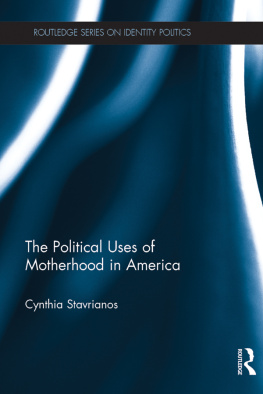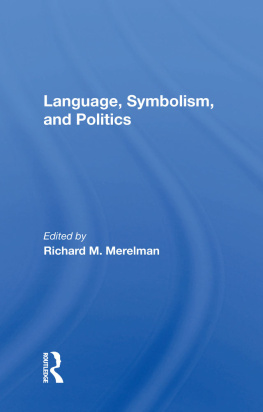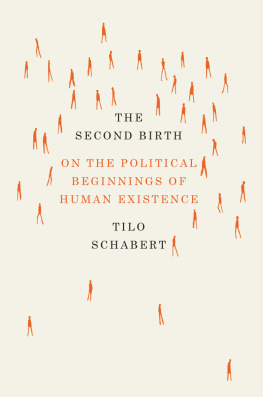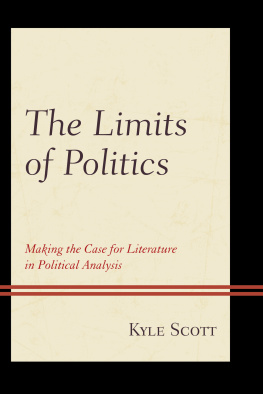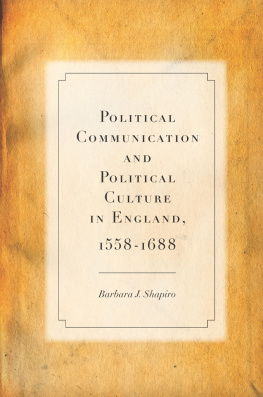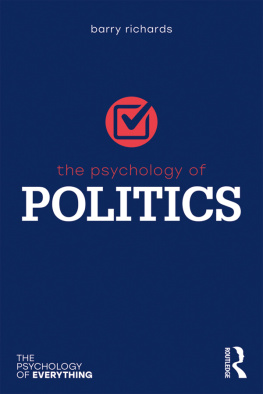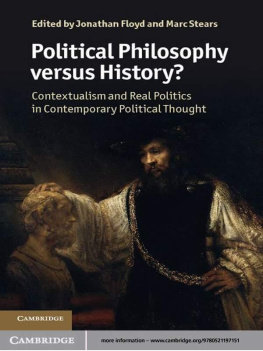Psychoanalytic Reflections on Politics
Salgs powerful study will take your breath away.
Frank Furedi, Emeritus Professor of Sociology
University of Kent, Canterbury
Psychoanalytic Reflections on Politics: Fatherlands in mothers hands is a playful exploration of how peoples desires, fantasies, and emotions shape political events and social phenomena. It highlights the mythical sources of todays political projects, the power of political imagination, and the function of symbolism in political thought. Eszter Salg argues that the driving force for the formation of political communities is fantasy illusions in a Winnicottian sense, phantasies in a Lacanian sense, phantoms as described by Nicolas Abraham and Maria Torok, and dreams as interpreted by Sndor Ferenczi. She introduces the metaphor of the fantastic family as a symbolic representation of political communities, both to reflect on peoples deeply felt desire to find in public life the resolution, love, and wholeness of early childhood, and to unveil the political elites readiness to don the mask of the ideal parent.
The book is divided into two parts. The first part of the book explores the theories of Donald Winnicott and Jacques Lacan: the matrimony on the stage of politics between the good-enough mother and the Symbolic Father which inaugurates the story of democracys fantastic family. The second part presents the fantastic families of selected countries such as Hungary, Italy, and the world community to explain the proliferation of cosmogony projects, and to document the failure of the political elites to offer a satisfactory performance of their maternal and paternal functions.
Psychoanalytic Reflections on Politics: Fatherlands in mothers hands presents a new way of considering the art of politics, based on the understanding that people perceive reality through imagination and unconscious fantasy. It will be of interest to psychoanalysts, and academics from across the disciplines of politics, psychology, anthropology, sociology, philosophy, literature, and art.
Eszter Salg teaches at the Department of International Relations at the American University of Rome.
Psychoanalytic Reflections on Politics
Fatherlands in mothers hands
Eszter Salg
First published 2014
by Routledge
27 Church Road, Hove, East Sussex BN3 2FA
and by Routledge
711 Third Avenue, New York, NY 10017
Routledge is an imprint of the Taylor & Francis Group, an informa business
2014 Eszter Salg
The right of Eszter Salg to be identified as author of this work has been asserted by her in accordance with sections 77 and 78 of the Copyright, Designs and Patents Act 1988..
All rights reserved. No part of this book may be reprinted or reproduced or utilised in any form or by any electronic, mechanical, or other means, now known or hereafter invented, including photocopying and recording, or in any information storage or retrieval system, without permission in writing from the publishers.
Trademark notice: Product or corporate names may be trademarks or registered trademarks, and are used only for identification and explanation without intent to infringe.
British Library Cataloguing in Publication Data
A catalogue record for this book is available from the British Library
Library of Congress Cataloging in Publication Data
A catalog record for this book has been requested
ISBN: 978-0-415-62736-8 (hbk)
ISBN: 978-0-415-62737-5 (pbk)
ISBN: 978-1-315-86690-1 (ebk)
Typeset in Times
by HWA Text and Data Management, London
This book is dedicated to Trpe, Picur, and Esztike.
We must call the Witch to our help after all! Without metapsychological speculation and theorizing I had almost said phantasying we shall not get another step forward. Unfortunately, here as elsewhere, what our Witch reveals is neither very clear nor very detailed.
Sigmund Freud, Analysis Terminable and Interminable, 1937
Contents
PART I
The stage
PART II
The protagonists
I am very grateful to Frank Furedi for planting the seed of a book in my head, for providing it with water (sometimes intentionally, and sometimes not) and for defining the baobab that it has grown into strange. I would like to thank Jennie Bristow and Annie Katich who attended to the toilette of my plant; my gratitude is due to Routledge for offering it room in its fragrant garden.
Many thanks to my husband Antal who, from under my skin, has followed (and inspired) the course of the events and the swing of emotions, and has assisted me in many ways throughout the cyclic process of creation, and destruction and recreation. Kisses to our daughter Fiamma for being a playful and passionate fiamma.
Bjrn Thomassen and James Walston at the International Relations Department of the American University of Rome provided that facilitating environment where several fantastic binomi could jump into my mind and turn into studies. My students have also been of great help with their reflections and ideas, their smiles and tears, with their praises and criticisms, they have become the courses co-authors.
Sometimes I believe that Czeslaw Miloszs good friend, Joseph Brodsky, was right it isnt at all that we write for those who come after us. We write to gain the sanction of our forefathers! My thoughts go out to my parents and grandparents.
I would like to thank Patrizia Cavalli for granting me permission to translate and quote in this book an extract from her poem La Patria (published by Nottetempo in 2011) and Jonathan Jones, whose poetic vein was for me indispensable. I would also like to thank Guilford Press and Christopher Bollas for granting me permission to use a section of his poem Cyberspace, (published in 2007 in Psychoanalysis Review, 94: 710). I am grateful to Peter Orlay for embracing with great enthusiasm and kindness the idea to put his grandfather Lajos Kozmas drawing, Paprikajancsiszinhz (today the property of Ferenc Kiss), on the paperback cover of this book.
And finally, a very special bow to Paolo, who has been my (primal) loving audience.
When the state will supply its citizens with refrigerators and automobiles,
with white bread and a handsome ration of butter,
maybe then, at last, they will be satisfied.
Why wont the question work out as it should, when every step is logical?
What the devil does a man need?
Czeslaw Milosz, The Captive Mind, 1953
According to the Talmud, good questions dont have answers, while bad questions dont even merit answers. Haim Baharier, a French psychoanalyst of Polish origins and one of the main contemporary exponents of Jewish thought, reminded me of this at the Fourth Festival of Jewish Literature, held in Rome in 2011.
Miloszs questions, what the devil does a man need? and what does the state need to provide to satisfy people? (my paraphrase) are among those good questions that for centuries have been at the center of debates. Most philosophers and political and social scientists have given them serious consideration and provided partly or completely different answers. Offering some psychoanalytic and anthropological insights, in this book I will formulate my own open-ended answers. Drawing mainly on post-Freudian theories, I will re-conceptualize democratic politics in an attempt to move the debate forward with a new direction of inquiry.

